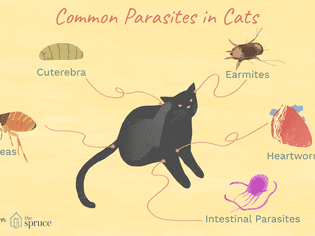
How to Stop Your Cat From Eating Dirt
Cats are well known for their weird, lovable antics, and eating dirt is definitely one of...
Kittens can be aggressive out of fear or playfulness, though both behaviors may look identical. You may feel as though your kitten is trying to attack you, jumping out at you from behind the couch, scratching at your hands, or randomly biting your shoes. It's unlikely that a scratch or bite from a house cat will be fatal, but such injuries can be painful and run the risk of infection. There are ways to address a kitten's aggressive behavior, most of which require just a little extra attention from its owner. Here's what you should know if your kitten is showing aggressive behavior.
The stalking and hunting instincts of their ancestors are still very strong in modern-day house cats. Usually, a cat sees something moving in a way that provokes the instinct to attack, meaning that the cat considers the object (a hand, a foot, a small child) to be a threat or prey. Either way, the cat is driven to use its claws and possibly its teeth to complete the attack.
Both play aggression and predatory aggression include distinct body language:
Most cats that are paired together at an early age learn to coexist peacefully, with the occasional disagreement. It's the cat owners who are the most frequent targets of kittens' aggression, especially those who don't live with other cats.
Before trying behavior modification techniques, it's worth a trip to the veterinarian to make sure there isn't an underlying medical condition causing a kitten's aggression. Diseases such as hyperthyroidism, osteoarthritis, dental disease, and central nervous system problems can make your otherwise docile and friendly cat become aggressive with little warning. A checkup to ensure your kitty's overall health should be your first step.
If your kitten gets a clean bill of health, the next step is to curb its behavior. This can take some time because cats are not social animals like dogs and don't respond the same way to aversion therapy. Prepare to be patient.
There are a number of ways you can encourage healthy, vigorous play in your kitten but avoid aggressive behavior that may result in injury.

Cats are well known for their weird, lovable antics, and eating dirt is definitely one of...

While it can be upsetting and frustrating, fighting between cats that live in the same ho...

Kittens, like children, learn how to behave appropriately at a young age—and during thi...

Litter-trained cats may be trained to do their business in the litterbox, but if your cat...

Your cat will display habitual behavior around mealtime when it is hungry, and many cats ...

Cheese is a staple food item in most homes. In fact, it’s so commonplace, some pet owne...

Cats are natural hunters who, when left to their own devices, would choose meat as their ...

Cats are susceptible to many different types of bugs and parasites, but there are two mai...

Chocolate is toxic to cats, so they should't eat it. While most pet owners are more conce...
Comments on "How to Stop Aggression in Kittens" :